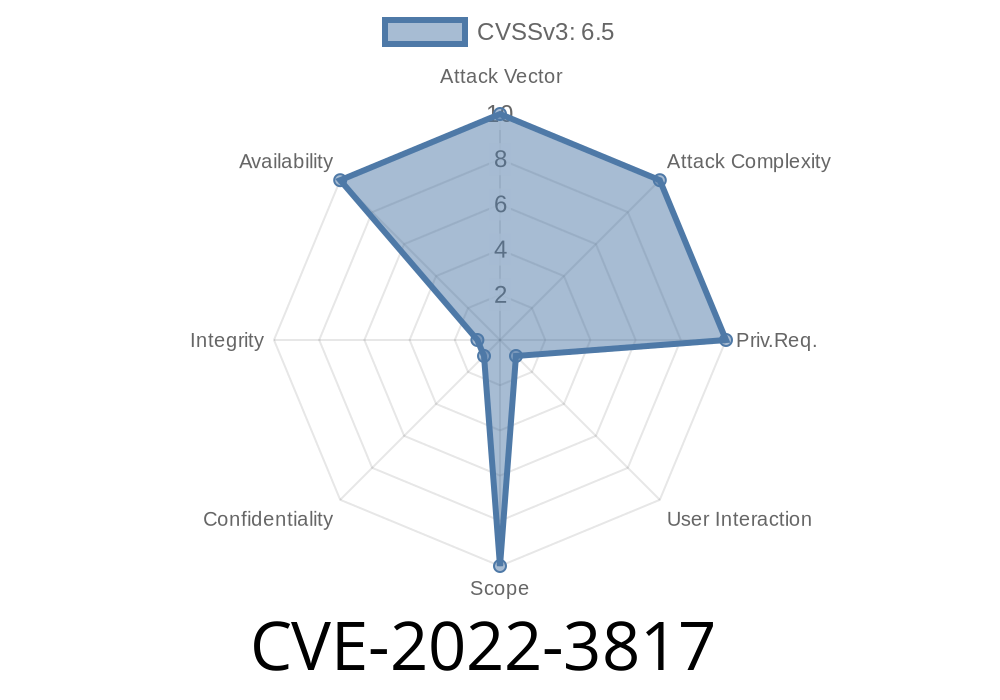CVE-2022-3817 marks a significant security issue discovered in Axiomatic’s Bento4, specifically impacting its popular mp4mux component. Bento4 is a widely used C++ toolkit for reading, writing, and inspecting media files such as MP4. If you’re working in video processing or streaming, there’s a good chance Bento4 is part of your stack.
This vulnerability was officially tracked as VDB-212683 and classifies as a memory leak issue—potentially leading to denial of service or degraded system performance, especially on systems processing many media files.
Let’s break it down in plain, simple terms, cover how this bug works, and see how attackers can take advantage of this flaw.
Background: What is Axiomatic Bento4?
Bento4 is a robust open-source library and toolkit written in C++. It’s designed for the manipulation of MP4 files and is the backbone for many video processing projects.
The mp4mux component is a command-line tool used to combine audio, video, and subtitle tracks into a single MP4 file. It’s powerful and helps developers efficiently prepare content for streaming and offline consumption.
Summary
| Identifier | Description |
|-----------------|-----------------------------|
| CVE | CVE-2022-3817 |
| VulnDB | VDB-212683 |
| Product | Axiomatic Bento4 |
| Component | mp4mux |
| Type | Memory Leak |
| Attack Vector| Remote |
| Impact | Denial of Service, Resource Exhaustion |
| Disclosure | Public, Exploit Exists |
| Original Reference | VulDB Entry |
What Does This Memory Leak Mean?
A memory leak means the program reserves memory (“allocates a block”) but never frees it up (“does not release it”). Over time, this can cause the program to use up excessive memory, slow down, or even crash.
In the context of mp4mux, this memory leak can be triggered by providing specific, possibly malformed, media files. An attacker could repeatedly send crafted files to a server using mp4mux, causing memory consumption to rise uncontrollably.
How Can It Be Exploited?
The exploit involves sending specially crafted MP4 or media files to a system running mp4mux. Since this component is often exposed as part of web APIs or batch processing systems, remote exploitation is feasible.
If an attacker continuously submits such files, the system’s memory usage will keep growing until it becomes unstable or unresponsive—potentially leading to a denial-of-service condition.
Example Exploit Scenario
Suppose an online video processing service uses mp4mux to generate streaming-ready files for user uploads. An attacker can upload a malicious file, and every time the backend tries to process it with mp4mux, memory leaks and is never released. Repeating the process can exhaust server memory quickly.
A Code Walkthrough: Where Is the Leak?
The Bento4 codebase is large, but the vulnerability centers on incorrect or missing cleanup of allocated memory in mp4mux. Specifically, if an error occurs while handling input streams, the cleanup routines might not trigger, causing memory not to be released.
Below is a simplified C++ example similar to what may be seen in mp4mux
// Vulnerable pseudo-code
char *buffer = new char[large_size];
if (process_input(buffer) == ERROR) {
return ERROR; // Oops: forgot to delete buffer!
}
delete[] buffer;
Notice that if process_input fails, we return early and never delete the buffer, leaking memory.
Fixed Code Example
// Fixed pseudo-code
char *buffer = new char[large_size];
if (process_input(buffer) == ERROR) {
delete[] buffer; // Clean up before returning!
return ERROR;
}
delete[] buffer;
Proper cleanup before any early return is critical.
Original Discovery and References
- VulDB Entry for CVE-2022-3817 (VDB-212683)
- Bento4 Official Github
- SecurityTracker Advisory
What Should You Do?
### 1. Patch/Upgrade
Check if there are updates to Bento4 addressing this issue. Always use the latest stable version.
2. Input Validation
Avoid processing files from untrusted sources, or sandbox tools like mp4mux to minimize damage in case of exploitation.
3. Monitor Resource Usage
Track your server's memory. Unusual spikes while processing media files might be a sign of exploitation.
Summary
CVE-2022-3817 exposes an important vulnerability in the wildly used Bento4 media toolkit’s mp4mux component. The bug leads to a memory leak, is triggered by malformed input files, and can be exploited remotely for denial-of-service attacks.
Action: Upgrade, validate user files, and monitor systems ASAP if you use Bento4!
*Stay safe, and keep your media toolkits patched!*
References:
- VulDB Entry: VDB-212683
- Bento4 on GitHub
- SecurityTracker Advisory on CVE-2022-3817
Timeline
Published on: 11/01/2022 22:15:00 UTC
Last modified on: 11/02/2022 18:54:00 UTC
